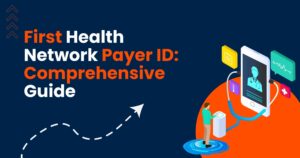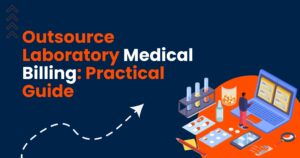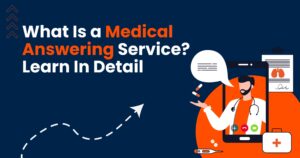The healthcare industry is immensely burdened by high operating costs, rigorous compliance regulations, slow and redundant processes, and maximum patient volumes. All these hardships poorly affect the quality of patient care and the operational speed of healthcare management.
To overcome these challenges, RPA in the healthcare industry significantly improves the patient experience, streamlines processes, enhances efficiency, and boosts innovation. Do you wonder how RPA fits into healthcare? This article aims to dive into the role of RPA in healthcare and explore the transformative impact of technology on the Medicare industry.
What is RPA in Healthcare and Understanding Its Role
Before you jumpstart, let’s throw some light on the statistics. The robotic process automation in healthcare was measured at $1.4 billion in 2022 and the speculations set the mark of $14.18 billion by 2032. The projected rate of CAGR is 26.1% from 2023 to 2032. Let’s understand the influence of RPA in the medical market.
It is a game-changing innovation to highlight that effective Electronic Health Records (EHRs), patient scheduling, medical billing, claims processing, and revenue cycle management are all actions performed by software. RPA is a valuable tool that mimics human actions in a highly sophisticated manner to handle high-volume, logic-based, and even redundant tasks while intelligently interacting with multiple other healthcare applications and systems.
Beyond these capabilities, RPA goes above and beyond in making life easier for patients and ensuring everything runs like clockwork. Let’s delve into its essence to understand its transformative potential in the healthcare industry.
- Sophisticated RPA bots operate tirelessly 24/7 with error-free results
- Streamlines patient appointment scheduling
- Promises healthcare workflow automation
- Seamless and successful claims processing
- Saves time and reduces error chances with data entry automation
- Smooth, synchronized and secure patient data management
- Ensures efficient and secure revenue cycle management
- Provides value-based healthcare model to medical facilities
- Promises uninterrupted patient registration
- Reduces burden on staff and streamlines healthcare administrative tasks
After having a snapshot of RPA’s role in healthcare, it is easy to realize how tough it is to spend endless hours filling out forms or sorting through large patient records. RPA uses predefined rules and structured logic powered by emerging technologies, including AI, NPL, and ML, for operational efficiency, informed decisions, analysis of vast troves of sensitive data, and resolution of business complexities. Let’s breathe a sigh of relief with RPA in the medical industry.
What is the RPA Use Cases in the Healthcare Industry?
It is necessary to look into some of the most common use cases of RPA use cases in healthcare to better understand why this industry should implement automation. Let’s buckle up for further details.
Insurance Claim Management
RPA streamlines healthcare claims management by simplifying the intricate insurance claim process. Automation makes this process efficient while adhering to all the regulatory protocols. Undoubtedly, there are multiple challenges in the medical billing process. However, the integration of RPA in insurance claims improves the workflow and medical billing process. It makes things easier for patients including insurance verification and auto form filling. No need to spend hours chasing up overdue payments or handling piles of insurance paperwork!
Digital Clinical Documentation
As the process is riddled with unwanted delays and errors, automation intervenes. It leverages various patient engagement techniques in the most logical and structured languages. These techniques are NLP, OCR and other data labeling procedures. RPA uses intelligent document processing (IDP) to effectively prepare and process documents.
Scheduling and Managing Appointments
Automation makes the appointment scheduling and management process swift and smooth. Patients often feel bogged down by tedious appointment processes. No need to face hassle anymore. RPA sends timely notifications to the patients as a reminder call about the appointment. Furthermore, it informs them about any changes in the schedule to make customers feel valued, avoiding unwanted confusion and hassle.
Post Discharge Management
Managing the patient discharge process is no small feat. The post-discharge process requires patients to fill out forms and follow the instructions. Isn’t it a laborious task? The practice management software can conveniently streamline this process through automated reminders or messaging portals. These reminders keep the patients updated about their upcoming appointments and medication by reducing the chance of missed follow-ups.
Workflow Management
All the administrative tasks involve the regular workflow including patient treatment, inventory control, resource utilization and more. Manual handling is highly chaotic, time taking and errant. RPA shifts the workflow to automation leading to seamless allocation and utilization of all the resources in healthcare.
Data Extraction and Analytics
Patients’ clinical records can be extracted and analyzed for internal research. The wealth of valuable EHRs and EMR documents supports diagnostic precision for customized treatment. Healthcare providers can better utilize business process automation in healthcare. Automation helps the analysis of healthcare information using patient monitoring systems for successful results.
Asset Tracking
Finding the details through a paper-based record is like a shot in the dark. The inefficiencies of staff often lead to a waste of time searching for misplaced tools and equipment. It also delays the treatment process. Experience interoperability in healthcare by integrating RPA software with IoT-based digital sensors to create a difference. It enables staff to easily locate devices, monitor equipment and manage inventory.
Revenue Cycles
Keeping the stats clear, RPA ensures up to 47% overall savings. RPA dramatically helps by improving billing performance, reducing operating costs, and increasing the sales cycle. It helps to take optimized financial data security measures for streamlined payable accounts and improved patient experience. Automation promises financial results that conventional manual methodologies are unable to do.
Regulatory Compliance
RPA in healthcare adheres to HIPAA privacy and security rules by intelligently automating multiple compliance-related operations. It ensures report accuracy, records maintenance and compilation of a data security checklist to streamline processes. The regulatory protocols help healthcare organizations maintain standards efficiently.
Benefits of RPA in Medicare Operations – A Clear Perspective
RPA doesn’t settle on improved accuracy and enhanced productivity. It also promises compliance to deliver satisfactory healthcare outcomes. Let’s explore the most influential benefits of the buzzword RPA in the healthcare sector.
Higher Appointment Turnout
The timely reminders by the bot about the patient appointment shun the need for human intervention. It accelerates scheduling at a faster pace, reducing the likelihood for the patients to forget about the scheduled appointment.
Personalized Patient Experience
RPA promises a personalized user experience by allowing healthcare professionals to provide better care facilities to patients. It improves their overall experience and satisfaction level.
Increased Cost Efficiency
Let’s debunk the myth that technology integration costs the wherewithal. RPA integration in the healthcare industry offers maximum savings by performing operations at a quick pace with efficiency. This results in savings on human resources.
Less of Human Errors
RPA eradicates the risk of human error significantly caused by lethargy or oversight. It improves precision, accuracy, and data quality for more seamless operations.
Better Record Protection
Automation ensures secure data transfer without posing a risk of unwanted access to medical reports by an unauthorized individual. It guarantees a secure environment for better data handling.
Challenges of Integrating RPA in Healthcare
Some of the vivid obstacles in harnessing the key benefits of RPA are listed here with the practical solutions.
Legal Compliance
The privacy and security of patient data require adherence to strict rules. Implementing RPA poses challenges. The solution is the implementation of information security laws such as data encryption, PCI DSS etc.
Intricate IT Setup
Healthcare firms often have intricate IT setup including outdated systems. It makes integration, configuration and data exchange difficult. The solution is to analyze the setup, use APIs and spot the integration points by collaboration with IT teams.
Scalability Maintenance
As the healthcare industry expands, it is a challenge to scale RPA strength to equate growing volumes. The designated staff also needs to upgrade and thoroughly maintain RPA bots. The solution is to develop a scalable RPA to streamline workflow and effectively adapt to future changes.
Change Management
Shifting from legacy procedures to RPA could massively disrupt workflows. Sometimes staff reluctance to accept change can pose a significant challenge to its seamless implementation. The solution is to enhance collaboration by providing training programs about RPA and its operational procedures in healthcare.
The scarcity of specialized resources in the healthcare industry hinders smooth navigation in terms of patient data management, insurance claims and more. Such a scenario calls for RPA to secure opportunities. By partnering with expert outsourcing companies, healthcare facilities can reduce the burden and navigate the future in the healthcare ecosystem that is more patient-centric and secure than ever before.





